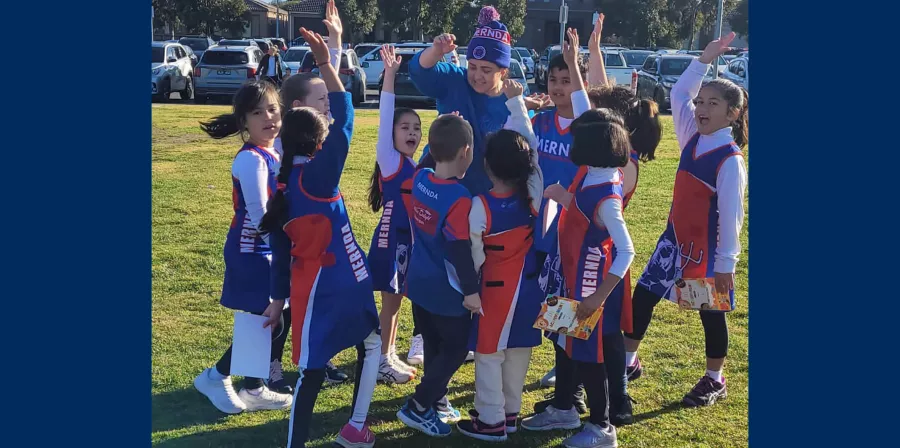Written by Amelia Barnes
Mernda Junior Netball Club in Melbourne’s outer north-east has been awarded the Inclusive Netball Community of the Year at the 2022 Netball Victoria Community Awards.
A relatively young organisation, Mernda Junior Netball Club has increased participation from three teams in 2020 to 11 in 2022 to become one of the largest netball clubs in the City of Whittlesea.
Players and parents are attracted to the club for its values, which allow every member to express themselves as they desire.
“We want to be more than just a netball club,” said Mernda's netball coordinator, Deb Kane. “Yes, netball is the reason our community comes together, but we like to educate and celebrate on matters that are beyond netball that make all our players better humans.”
Throughout the year, Mernda Junior Netball Club hosts several events and special rounds to recognise and showcase its diverse community. “We want our community members to feel valued and a part of that is celebrating what they celebrate,” said Kane.
Among these occasions is NAIDOC Week, which sees Mernda Junior Netball Club host its annual Indigenous round honouring Marcia Ella-Duncan - the first First Nations player to represent the Australian Diamonds national team. The round is dedicated to celebrating the club’s First Nations participants, and the player of each match receives a ‘most deadly’ award.
To further highlight the history and contribution of First Nations peoples, Mernda Junior Netball Club is working with Wiradjuri Kamilaroi woman Bek Lilley, founder of activewear label Too Solid, to design an Indigenous training top for the club.
“Bek’s design and guidance has had a big impact on our club activities and our approach to inclusive policies towards our Indigenous players to ensure we reduce the barriers stopping them playing netball,” said Kane.
Religious occasions are also recognised by Mernda Junior Netball Club to celebrate players’ faith and support them to play. For example, Muslim players are supported with a modified training while fasting during Ramadan.
The club has also celebrated the Hindu festival Holi with a colour party, Diwali with a lights party, and Easter with an Easter egg hunt.
Another club initiative is Rainbow Day - an age-appropriate way to introduce Pride round and celebrate the LGBT+ community - organised by association representative Janine Hyndes.
“It’s a safe space where players are allowed to be themselves and know they have the support of the community behind them,” said Kane.
Players of all genders are invited to play at Mernda Junior Netball Club. There are now seven male participants between the ages of five and 14, and Kane is passionate about encouraging more to come on board.
“We know that there has often been a stigma with boys playing netball and we want to dispel that stigma and highlight our players,” she said.
The club has hosted specialist sessions for boys and male coaches including those run by Australia’s men's player and newly appointed West Coast Fever talent coach, Guy Keane.
“We believe you have ‘be what you can see’ and if the boys don’t know their options or their male netball heroes they won’t become the future ones,” said Kane.
At the heart of these many initiatives is Mernda Junior Netball Club’s number one goal - to get kids out on court.
“The kids are always at our forefront of our mind, and we want to do whatever we can to reduce any barriers they have to getting on court,” said Kane.
“We host our come and try events which is an easy way for new individuals wanting to try netball for the first time… If there are financial barriers, we have hardship funds and payment plans available. We have a diverse uniform and players can pick what they find most comfortable.”
In 2023, Mernda Junior Netball Club will separate from its partner football club to become a standalone organisation. The club’s focus is to continue delivering netball, expand its community outreach programs, and celebrate more events important to members and their backgrounds.
The Inclusive Netball Community of the Year Award is supported by RACV
